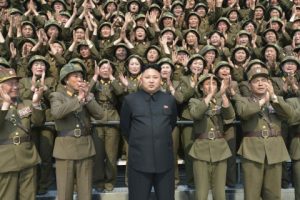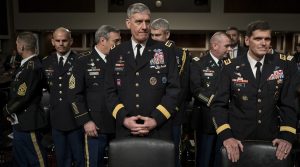A Washington Post –ABC News poll of Americans is showing disapproval for preemptive military strike against North Korea contrary to the preference Donald Trump, the US president, signified in his last Tuesday speech at the UN General Assembly during his first appearance there as US president.
According to the report on the poll just published in The Washington Post, the preference of the poll participants is tougher economic sanctions on North Korea which they believe would persuade the North Koreans to think twice about de-nuclearising. The paper puts the fraction of those in this camp of reasoning at roughly three-quarters of the poll participants. It is much higher than about one-third who thinks the United States’ best option is incentivising North Korea with foreign aid or any other such incentives.
But the more revealing aspect of the poll is the pollsters’ impeachment of President Trump as far as responsible handling of the crisis, trusting the military establishment more in that regard. This is how The Washington Post reported that aspect of the joint exercise with ABC News: The Post-ABC poll finds 37 percent of adults trust Trump either “a great deal” or “a good amount” to responsibly handle the situation with North Korea, while 42 percent trust the commander in chief “not at all.” By comparison, 72 percent trust U.S. military leaders, including 43 percent saying they trust them “a great deal”. Compared to Trump, the North Korean leader, Kim Jong Un, performed more miserably in the eyes of the American public. Only 8 percent of the Americans surveyed think anything of his ability to act responsibly. That doesn’t make the distrust in President Trump as a responsible handler of the crisis any less weighty since it is Americans versus their president unlike the verdict on Kim Jong Un who, in the best of circumstance, would still have been seen from a binary lens of the insider/outsider that international relations talk about in such matters.

North Korean leader in his trademark outfit with his militariat
Recalling recent exchange of verbal missiles in which Kim Jong Un called President Trump “a mentally deranged U.S. dotard,” in response to Trump calling him “a madman”, the Post noted how each then vowed to test the other as never before, followed by Washington rolling out new sanctions last Thursday as well as a show of military force two days later in flying bombers along the North Korea coast. This was a day after North Korea announced its planned conduct of a hydrogen bomb test over the Pacific. Thus the Post opined how the war of words between the two might have opened what it calls a potentially dangerous new chapter in the North Korea crisis.
The post is also recalling how senior American government officials such as Defence Secretary Jim Mattis, Secretary of State Rex Tillerson and other national security officials have been emphasizing the diplomatic approach to North Korea, with Mattis said to have shied away from “the rhetorical bombast employed by his boss” even while leaving no one in doubt the United States’ preparedness to use overwhelming force in retaliation.
A few points about the poll would include the following. The paper put the date the poll was conducted as September 18th – 22nd, 2017. That means the poll started a day before Trump spoke at the UNGA on September 19th. Although only 1002 adults participated in the poll, it is taken as reflective of the larger American population because there is an ordering principle in the selection process that makes it so. Thirdly, the doubt about Trump as a responsible handler of the crisis cuts across the two dominant political parties – the Republicans and the Democrats although the partisan divide showed up in details of the poll provided by the paper. Republican support for bombings, notes the Post, has more than doubled, from 29 percent in 2005 to 63 percent today but most Democrats and independents are said to still be in opposition on this. Notwithstanding this, the results show a rise in support for military intervention among Americans than has been the case in the past. In fact, 4 in 10 Americans are now revealed in the answer to a particular question to support bombing North Korean military targets. This contrasts with the 2 in 10 in 2005.
The Washington Post introduced the two of its editorial staffers who handled the poll as Scott Clement, its polling manager and a specialist in public opinion about politics, election campaigns and public policy and Philip Rucker, its White House Bureau Chief who has previously covered Congress, the Obama White House and the 2012 and 2016 presidential campaigns after joining The Post in 2005 as a local news reporter.

Some American field commanders
The take home point in the poll verdict might be how it happens that some other American institutions are always thought to be there to manage Donald Trump. Initially and generally, it was the assumption that the Central Intelligence Agency, (CIA) would tame Trump. Now and on the specific case of handling the North Korean nuclear capability, a poll is expressing trust in the American military to act more responsibly than the president. The question is what this trend speaks to in global security? It is a question which concerns everyone, poor and rich, powerful and powerless, especially in relation to war as might be looming in North Korea.
The all time big question in post Cold War International Relations is whether there is still anything called geopolitics. That is the territorial practice of power that states engage in through the framing of the global space (which is what has made the media and other platforms of popular culture to now have co-equal status with older instruments of statecraft such as intelligence, diplomacy and the military) and geopolitical actions that follow, such as war. There are two camps to this question – those who deny it and those who acknowledge it. A leading claim among those who acknowledge it is the distinction they make between managers of state power and the capitalist class proper in industrial societies such as the United States regarding geopolitics.
The poll distinction between the president and the military establishment might or the CIA might, therefore, be taken as a validation of that claim by the voters or the citizens. The lesson is that foreign policy, like domestic politics, is an arena of contest between the fractions of the ruling class in all countries. These fractions are, however, not seen in open boxing tournament as we see in Nigeria, for example, because both the managers of state power and the capitalist class proper have stakes in the system. In countries such as Nigeria, the open boxing occurs because the capitalists proper do not exist. What exists is what a Nigeria’s former president, Obasanjo, calls baby capitalists who depend on the state itself for breakfast, lunch and dinner, one way or the other. When the state annoys one or some of them, they can afford to fund any uprising. The Nigerian government claimed in the past week, for instance, that the Indigenous People of Biafra, (IPOB) articulating secession is a project of disgruntled politicians. Discursive as the word ‘disgruntled’ is, the claim supports the thesis that instability in Nigeria is, in the last instance, a function of ruling class fragmentation, not identity incompatibility between numerous ethnic or religious groups. That means that industrialisation has got more political than the economic essence and remains the way to national stability for Nigeria, for instance, than all the sermons on patriotism and national unity.




























